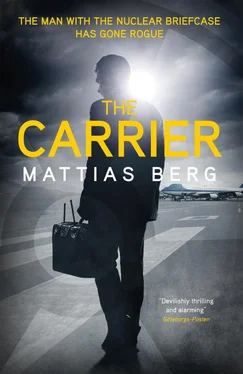Mattias Berg - The Carrier
Здесь есть возможность читать онлайн «Mattias Berg - The Carrier» весь текст электронной книги совершенно бесплатно (целиком полную версию без сокращений). В некоторых случаях можно слушать аудио, скачать через торрент в формате fb2 и присутствует краткое содержание. Город: London, Год выпуска: 2019, ISBN: 2019, Издательство: MacLehose Press, Жанр: Триллер, на английском языке. Описание произведения, (предисловие) а так же отзывы посетителей доступны на портале библиотеки ЛибКат.
- Название:The Carrier
- Автор:
- Издательство:MacLehose Press
- Жанр:
- Год:2019
- Город:London
- ISBN:978-0-85705-788-4
- Рейтинг книги:4 / 5. Голосов: 1
-
Избранное:Добавить в избранное
- Отзывы:
-
Ваша оценка:
- 80
- 1
- 2
- 3
- 4
- 5
The Carrier: краткое содержание, описание и аннотация
Предлагаем к чтению аннотацию, описание, краткое содержание или предисловие (зависит от того, что написал сам автор книги «The Carrier»). Если вы не нашли необходимую информацию о книге — напишите в комментариях, мы постараемся отыскать её.
The Carrier — читать онлайн бесплатно полную книгу (весь текст) целиком
Ниже представлен текст книги, разбитый по страницам. Система сохранения места последней прочитанной страницы, позволяет с удобством читать онлайн бесплатно книгу «The Carrier», без необходимости каждый раз заново искать на чём Вы остановились. Поставьте закладку, и сможете в любой момент перейти на страницу, на которой закончили чтение.
Интервал:
Закладка:
“Ed and we are still chained to each other, my treasure. He knows very well that I’ll reveal everything as soon as he makes any serious attempt to capture us. And what’s more that I’ve planted a Plan B. with some other person on this earth—without him having any idea who it is. Who might be the Needle in the Haystack, among the world’s seven billion inhabitants. Who won’t be able to cause as much damage as you and I, it’s true, but with the help of some of my chosen supporters still enough to eliminate nuclear weapons as a military strategic tool for decades to come, if not longer.”
“Was that why Edelweiss let us go at Dulles?” I said.
“Perhaps. Or else he wants to see where it all leads, follow the threads the whole way. Or maybe just give himself time to understand our irrational style of play. The fact that we were prepared to offer up Jesús María in exchange for John: a black knight for a pawn. Or maybe he’s just turned.”
Then she said nothing more—and I did not ask.
When C.N.N. at last changed topics, we switched to the local news. Ingrid no longer needed to translate the items about the M.U.O.S. base, very close to us here, 3.24 miles according to her computer. The pictures told their own story. The protests and incursions, the whole resistance, seemed to grow by the day. As did the violence of the reaction. The T.V. images showed another encounter between encroaching activists and the local authorities: that is to say a loose mixture of Sicilian policemen, N.A.T.O. forces and American security guards. Young women being beaten nearly unconscious with batons. A soldier stamping three times on an activist who already lay on the ground, trying to shield his head with his hands.
The next feature showed another eruption on Etna. We sat spellbound, watching that thick, glowing mass consuming everything in its path. A natural weapon that still nobody could protect themselves against. I could not help thinking of the parallel with our assignments, now and always. The merciless snail’s pace, that slowly gnawing panic, terror, petrification or obliteration.
But when the signal finally came, toward the end of February, it was unmistakable. I knew it in the same instant that I saw the headlines on C.N.N. This would be Ingrid’s starting point—as well as that of the military authorities at the M.U.O.S. base. The moment when everyone would be looking in another direction.
The fuzzy images in the darkness showed soldiers without uniforms. Quick, almost invisible movements in low resolution. Their clothes tight-fitting and jet-black, darker than the surrounding night, what was called “general combat wear”. In theory they could have been any mercenaries. Yet all those in the know were very clear about where they came from. That the persistent rumors to the contrary were disinformation, cyberattacks, red herrings. Just the sort of hybrid warfare that we ourselves had been trained for—and against—throughout our adult lives.
There had been many warnings that Russia would occupy Ukraine, probably going in via Crimea, even from our own observers. Those who had long been obsessing about the traditional enemy. That it was Russia which would continue to be our main sparring partner, regardless of the fact that the headlines were talking about al-Qaeda or Iran or I.S. Whatever that alarming group now happened to call itself.
The C.N.N. commentators seemed almost relieved that the natural order of things had been re-established. That it was us versus them once more, west against east. One of the presenters already used the expression “Cold War 2.0”.
And if Ukraine had not, after the fall of the Berlin Wall, handed over its nuclear weapons to Russia, in return for what was then called protection , the tension could rapidly have become apocalyptic. When the images shifted to Moscow—where soldiers were seen leaning out of train windows, their loved ones cheering and crying all at once, and men in bars were following the crisis on wide-screen T.V.s as if it were a sporting event—I came to think of the crowds on docks and station platforms waving soldiers off to the First World War. To what was meant to be a triumphal march, a walk in the park.
According to the experts in the studio, Russia had brought its new S.S.27 long-range missiles into service just a week or so earlier. And days after the Russians’ gigantic training maneuvers on the theme “Simulated large-scale nuclear weapons attack”, which they otherwise used to hold in the fall, our forces had replied with yet another comprehensive “Global Lightning” exercise. So the game was already in full swing.
In addition, what our security services had been warning us about for many years had now been made public in the usually reliable magazine Foreign Policy . The C.N.N. anchor asked the experts for their views on what the Russians themselves simply called “Status-6”. Their plans for a new underwater drone armed with a powerful thermonuclear weapon, causing especially high levels of radiation, designed, for example, to attack New York’s harbor area. Making the city essentially uninhabitable for decades to come, through both its primary and secondary effects. Rather like Edelweiss’ simulations: the hydrogen bomb over Manhattan slowly blossoming out on the screen.
Some of the experts in the studio pointed out another remote but natural association: between the continuing “Nuclear Weapons Scandal”, with burned-out missile operators cheating on safety tests as a matter of routine, and the growing crisis in Crimea. That a cure for the missing sense of purpose they had felt was perhaps near at hand. And that “our boys”, as he expressed it, might now have an objective in their minds following the Crimean crisis. Not just the underground missile forces, but also the men handling our nuclear missiles on submarines, or bombs from aircraft. That this would at least get them to pull themselves together.
I tried to read his facial expression. Whether he was being serious, or just trying to be amusing. In this situation.
The wind had been building up over the last few days; the first scirocco of the year was rattling the window panes. Even the indoor temperature rose by the hour in line with the strength of the wind. I put aside thoughts of going for a last run around the area, some sort of meaningless reconnaissance. Instead I went to bed at the same time as Ingrid turned off the T.V.s and returned to her terminal.
“It’s confirmed,” she said, “the inauguration of the M.U.O.S. base will be tomorrow.”
6.10
I dreamed I was General Curtis LeMay, some time during 1954, the year which he had foretold as Ragnarök. When we were for the first time to confront the full military potential of the Soviet Union, following the introduction of nuclear weapons into the world.
We sat gathered together before an early form of computer, the whole potent little command group of S.A.C., Strategic Air Command. I had finally managed to plant at least the idea in their minds. Let our spy planes fly so close to the frontier that they could ratchet up Russian preparedness to the point where an attack against them might feel justified.
There is an historic moment, I said, breaking the silence, when we could win a nuclear conflict with Russia. That moment is now. Not earlier, not later. The Russians will need a month to deploy their 150 hydrogen and atomic bombs in total. Our 750 will need no more than a few hours.
The bulky computer helped me to illustrate the unthinkable, unfolding events step by step. With the help of an astonishing level of technology for the time, successive maps showed the evolution hour by hour, how the Soviet Union was being covered by ever thicker lines. Each line represented a separate flank in the attack. Everything pointed straight at the heart of Russia, Moscow, and on the way there the rest of the country was being wiped out as collateral.
Читать дальшеИнтервал:
Закладка:
Похожие книги на «The Carrier»
Представляем Вашему вниманию похожие книги на «The Carrier» списком для выбора. Мы отобрали схожую по названию и смыслу литературу в надежде предоставить читателям больше вариантов отыскать новые, интересные, ещё непрочитанные произведения.
Обсуждение, отзывы о книге «The Carrier» и просто собственные мнения читателей. Оставьте ваши комментарии, напишите, что Вы думаете о произведении, его смысле или главных героях. Укажите что конкретно понравилось, а что нет, и почему Вы так считаете.












